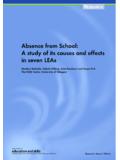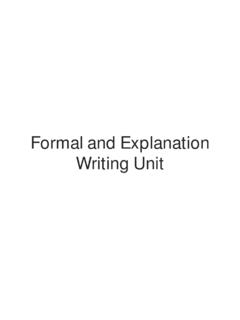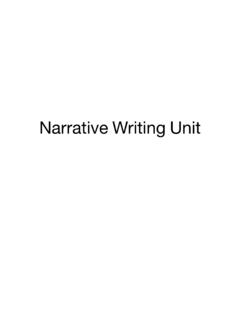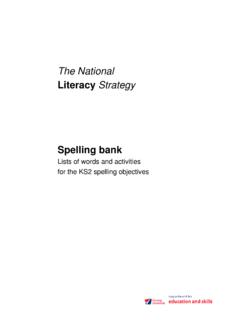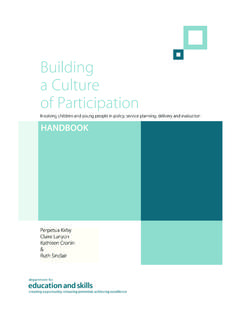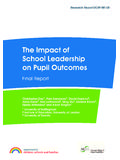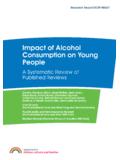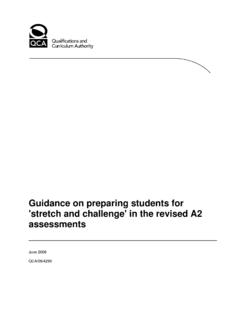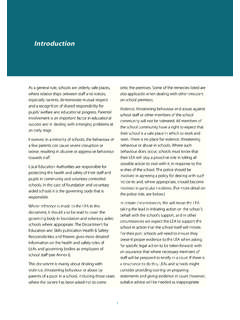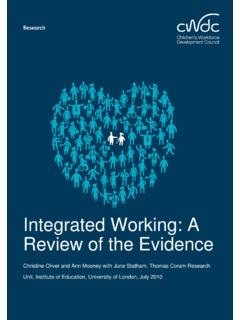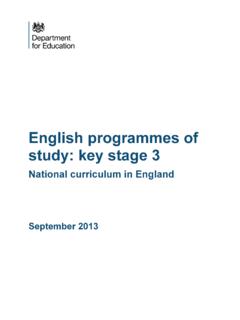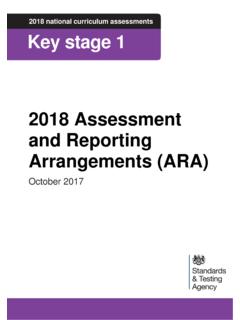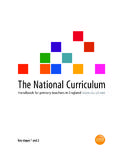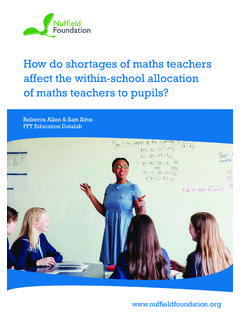Transcription of Framework for teaching science - UCL Institute of …
1 key stage 3 National StrategyFramework for teaching science :Years 7, 8 and 92 Framework for teaching science : Years 7, 8 and 9 Crown copyright 2002 ForewordScience is diverse and exciting. It helps pupils to explore the world around themand understand so many things that have such relevance to daily life. Pupils must,therefore, have the best possible support for learning science at is an integral part of our key stage 3 Strategy for strengthening standardsin the early years of secondary education. We began this national strategy withEnglish and mathematics, and the Frameworks we published for those subjectshave been widely welcomed by teachers. The spotlight now moves appropriatelyin science Year to the teaching and learning of Framework for teaching science : Years 7, 8 and 9will help teachers to teachengaging, challenging and inspiring lessons, and to establish high expectations fortheir pupils.
2 It draws on the DfES/QCA scheme of work for science , and explainsthe ideas underlying the National Curriculum programme of all our materials for the key stage 3 Strategy, teachers have played animportant role in their development, and the science Framework is based on bestpractice and the experiences of pilot schools and other partners. We want schoolsto make a professional judgement about how to use it, depending on their owncurrent ways of working and development hope you will see the science Framework to be a valuable resource that supportsgood teaching and learning. Through the key stage 3 Strategy we have embarkedon an ambitious programme for our 11- to 14-year-olds but, with teachers continuing support and commitment, we are confident about its Rt Honourable Estelle Morris MPSecretary of State for Education and SkillsApril 2002 Crown copyright 20023 Framework for teaching science : Years 7, 8 and 94 Framework for teaching science .
3 Years 7, 8 and 9 Crown copyright 2002 Contents1 Introduction7 What the Strategy involves7 About this Framework72 science at Key stage 311 The science curriculum11 The approach to teaching science11 Scientific enquiry11 The five key scientific ideas14 Progression in key stage 3 science22 Yearly teaching objectives in key stage 3 science243 Raising standards in science31 The role of the subject leader324 Planning35 Long-term and medium-term plans35 Short-term or lesson plans37A sample lesson375 teaching and learning strategies41 teaching time41 The focus on direct, interactive teaching41 Effective science lessons43 Using ICT in key stage 3 science466 Assessment and target setting49 Short-term assessments49 Medium-term assessments51 Long-term assessments527 Inclusion and differentiation55 Differentiation in whole-class oral and mental work55 Differentiation in written work and homework56 Able pupils and those who are gifted and talented56 Pupils who make less than expected progress57 Pupils who need help with English, including EAL learners58 Pupils with special educational needs (SEN)59 Using teaching assistants, including support for SEN and EAL62 Using the science Framework in special schools638 Related publications and websites65 Appendix 1 From Key stage 2 to Key stage 367 Appendix 2 Yearly teaching objectives for scientific enquiry (Sc1)71 Appendix 3 Scientific vocabulary73 Crown copyright 20025 Framework for teaching science .
4 Years 7, 8 and 96 Framework for teaching science : Years 7, 8 and 9 Crown copyright 2002 IntroductionThe Government has set ambitious national targets for pupils achievements in theNational Curriculum tests for science at the end of key stage 3 . By 2007, 80% ofpupils are expected to reach level 5 and above, with a milestone target for 2004 of70% at level 5 and above. To reach these goals will need effective teaching andraised expectations of all National Strategy for key stage 3 is part of the Government s support forschools as they strive to reach their targets. It began in schools in September 2001with the introduction of two strands: English and mathematics. Three other strands science , information and communication technology (ICT), and teaching andlearning in the foundation subjects (TLF) will be introduced in 2002 03. The pilot of the science strand involved just over 200 schools across 17 LEAs fromJanuary 2001 to April 2002.
5 Case studies illustrating how these schools havetackled aspects of the Strategy are on the DfES Standards the Strategy involvesAs part of the Strategy schools are asked to: audit standards, teaching and learning; make effective use of the Strategy s Frameworks for teaching and the QCAschemes of work, either directly or to customise their own schemes of work; take part in selected units of continuing professional development andundertake follow-up work in school; take part in whole-school initiatives on cross-curricular issues, such as literacyand numeracy across the curriculum; support transition from Key stage 2: for example, by offering a summer school,and by providing catch-up classes for Year 7 pupils who did not previouslyachieve level 4 in English and mathematics; provide mentoring for Year 8 pupils who are falling behind and becomingdisaffected; provide booster support for Year 9 pupils before the national tests for KeyStage starting point for science in relation to the Strategy is an audit of standards, teaching and learning in key stage 3 science , including some sampling of pupils work and observation of this FrameworkThis Framework for teaching science : Years 7, 8 and 9is similar to the Frameworksfor teaching English and mathematics.
6 It provides practical suggestions and adviceon meeting the National Curriculum requirements for science . It should be readalongside the exemplar DfES/QCA publication, science : a scheme of work for KeyStage 3, referred to here as the QCA scheme of work for science . Crown copyright 20027 Framework for teaching science : Years 7, 8 and 9 Section 1 Introduction1 The purposes of the science Framework are: to bring together in one place the experience of the pilot and best practice insecondary schools, much of which will already be familiar to teachers; to ensure that scientific enquiry is integrated with and taught alongsideknowledge and understanding in a range of contexts; to identify the key scientific ideas that underpin science at key stage 3 ; to set out yearly teaching objectives for Years 7, 8 and 9 that build on sciencein Key stage 2 and develop pupils understanding of the key scientific ideas inKey stage 3; to give advice on how teachers and trainee teachers can use the yearlyteaching objectives to plan and teach appropriately challenging and engagingwork to their pupils; to provide a basis for target setting.
7 To enable headteachers and curriculum managers to set high and consistentexpectations for pupils science Framework is written mainly for heads of science departments, science teachers and trainee teachers. It will also be of some interest to: senior managers in secondary schools and LEA inspectors and advisers whosupport and monitor science teaching and standards; lecturers and independent consultants who advise science teachers or leadprofessional development programmes for them; inspectors who undertake inspections on behalf of contents of the science FrameworkThe expected development of pupils knowledge and skills in science , and theirunderstanding of key scientific ideas, is outlined by yearly teaching objectives forYears 7, 8 and 9. These objectives are based closely on the Key stage 3programme of study for science but do not cover it all. They are the essentialobjectives which identify for each year the core of what pupils should know andunderstand about scientific enquiry and key scientific ideas.
8 They should determinethe focus of teaching plans and formative rest of the document gives advice on planning, teaching , learning andassessing the science curriculum in key stage 3 . Some sections are relatively brief,such as those on planning, on differentiation, or on teaching in special and safety issues are not discussed. These topics are dealt with in greaterdetail in the Strategy s associated training and in the publications listed in section 8(pages 65 66). 8 Framework for teaching science : Years 7, 8 and 9 Section 1 Introduction Crown copyright 2002 Three appendices supplement the main 1describes what most pupils should have learned in science by theend of Year 2shows how the yearly teaching objectives relate to the strands ofscientific enquiry (Sc1) in the key stage 3 programme of study. Appendix 3is a checklist of the key scientific vocabulary used in the yearlyteaching objectives and the QCA scheme of work for the science FrameworkThe Government believes that science teachers will find the Framework a helpfultool for reviewing and adjusting their practice.
9 Many will wish to use it for planningtheir lessons. There is, after all, no point in individual teachers re-inventing solutionsto problems and challenges that are common to all. Schools should make aprofessional judgement about how to implement the advice in this Framework ,once they have studied it, evaluated their current practice and considered theirprofessional development factors below should influence the degree to which a science departmentadjusts its current practice: pupils past, current and expected attainment in science and the extent towhich the department is likely to meet its target for raising standards; the extent to which teaching objectives and expectations of pupils in sciencecompare with the detail, challenge and rigour of those in this Framework ; the curriculum leadership in the department and the department s effectivenessin evaluating its strengths and weaknesses, and in planning action to achievehigher standards.
10 The quality of the planning, teaching and assessment of science and how thesecompare with the criteria identified in this Framework ; the extent to which the department is staffed by teachers, including thosequalified in physics, chemistry, biology and other science qualifications such asgeology or biochemistry, who may need support with their planning andteaching across the whole of science , especially when they are teachingbeyond their specialism; whether the department is already involved in an initiative to raise standards inscience in key stage 3 , through a properly supported programme thatincorporates practices similar to those described in this Framework , making itpossible to continue its own project development alongside the Strategy. Crown copyright 20029 Framework for teaching science : Years 7, 8 and 9 Section 1 Introduction10 Framework for teaching science : Years 7, 8 and 9 Section 1 Introduction Crown copyright 2002 science at key stage 3 The science curriculumScience at key stage 3 builds on the knowledge, understanding and skills thatpupils have developed in Key stage 2.
